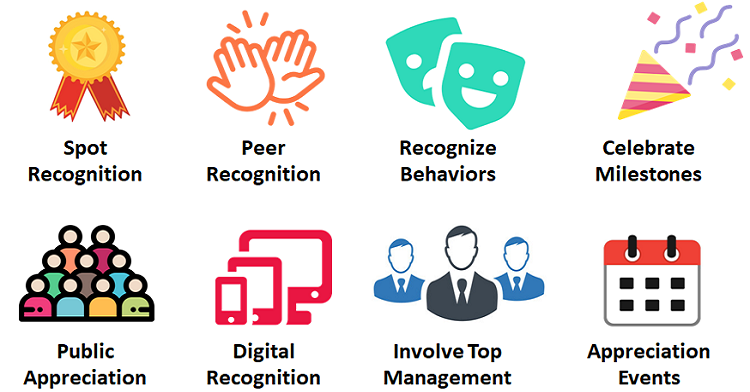1. Organizations should implement spot award programs, promote peer-to-peer recognition, and encourage managers to recognize employees for behaviors that align with company values, not just outcomes, to foster a culture of appreciation.
2. Celebrating employee milestones and publicizing appreciation through digital platforms is also essential.
3. Involvement from top management and appreciation events further solidifies this culture, improving employee satisfaction, productivity, and retention.
Building a culture of appreciation is essential for organizations seeking consistent growth and success. It means consistently acknowledging employees’ contributions to achieving both short-term and long-term business objectives.
Fostering this type of work environment goes a long way in assuring employees that they are seen, heard, and valued for who they are and what they do.
It directly boosts their motivation and ensures they continue giving their best.

Being appreciated is a fundamental human need; fulfilling this need is key to keeping people happy and motivated.
Appreciation is all about acknowledging and respecting the specific personality traits, behaviors, skills, and knowledge that each person has and how he or she uses them to get desirable outcomes.
In a work environment, appreciation is all about making people feel valued as individuals and recognizing their efforts and achievements.
Most people spend a significant portion of their day interacting with their peers, managers, and subordinates.
Hence, quite unsurprisingly, the employees tend to develop social and emotional bonds with their co-workers.
Having a culture of appreciation ensures that workplace relationships between employees are positive and pleasant.

Appreciation can range from sending thank you notes to offering spot awards. It can go a long way in enhancing trust and communication between workforce members.
A culture of appreciation inspires and motivates employees to continue with the organization, put in their best efforts, learn, and grow.

A culture of appreciation helps to boost the morale of the employees and makes them more appreciative of their co-workers.
Appreciation strategies, such as peer-to-peer recognition, motivate them to collaborate, cooperate with their co-workers, and give their best to fulfill business objectives.

One of the biggest benefits of having a culture of appreciation is that it boosts workforce productivity significantly.
Employees who feel valued and cherished as individuals tend to become more efficient and productive in their assigned tasks.

When employees receive appreciation for their efforts and their achievements, they tend to feel more satisfied and content.
This enhances their sense of commitment and dedication toward the organization and minimizes their chances of leaving the organization in the near term.

A culture of appreciation is the key to building a pleasant workplace where employees do not feel too stressed.
It helps enhance employee efficiency in the long run and minimizes the risk of them feeling overworked and overburdened, which can lead to early burnout.

A culture of appreciation ensures a higher level of satisfaction and happiness for the employees.
It makes them feel less inclined to seek job opportunities elsewhere.
It, in turn, helps improve talent retention rates and can provide the organization with a significant competitive advantage.

A work culture based on constant appreciation is the key to ensuring a better employee experience.
It helps strengthen the social bonding between co-workers and makes it easier for them to work together as a team.
Over the years, organizations have come to realize that employee recognition can help create a culture of appreciation effectively.
Here’s how organizations can use recognition to foster a culture of appreciation in their workplaces:
1. Create Spot Award Program
2. Promote Peer-To-Peer Recognition
3. Recognize Behaviors, Not Just Outcomes
4. Celebrate Employee Milestones
5. Make Appreciation Public
6. Go Digital With Recognition
7. Involve The Top Management
8. Conduct Employee Appreciation Events


One of the most effective ways to build a culture of recognition is to encourage line managers and supervisors to send appreciation notes and e-mails to employees for their good work spontaneously.
These small gestures go a long way in making the employees feel valued and boosting their confidence.

Being recognized by their co-workers is one of the best forms of appreciation sought by employees.
It helps enhance their sense of belonging within the organization and strengthens their social bonds with coworkers, resulting in better teamwork.

It is important to recognize employees displaying behaviors that are in alignment with the core values of the organization and not just for outcomes and business achievements.
Such recognition can help develop a culture of appreciation that is deeply entrenched in the organization and sustainable in the long term.

Celebrating key employee milestones such as birthdays and work anniversaries can go a long way in making them feel appreciated as individuals.

To make the employees truly appreciated and valued, it is essential to recognize both their big and small achievements
Organizations should consider making use of large forums such as team meetings and town halls to acknowledge and highlight the good work of their employees.
Such public recognition can boost their self-worth and pride in the organization.

Implementing employee recognition software is one of the easiest ways of creating a culture of appreciation.
Recognition softwares makes implementing programs such as spot recognition, peer recognition, employee milestones, and other forms of rewards and recognition easy,
Digital recognition also aligns well with employee expectations, particularly among younger workers.
With employee recognition software integration, acknowledging and appreciating employees on internal platforms, such as Microsoft Teams and Slack, or social media platforms, like LinkedIn, can become much more manageable.

Organizations need to ensure the involvement of the members of the top management in the employee recognition programs, especially as part of the program communication and award ceremonies.
It helps enhance the program’s authenticity and credibility in the eyes of employees.

Organizations should look at leveraging special occasions such as Employee Appreciation Day, Thank You Day, International Mentoring Day, etc. to conduct employee appreciation events such as an appreciation week.
These events can provide an excellent opportunity for managers and coworkers to recognize and appreciate other employees.
Building a culture of appreciation by implementing an effective employee recognition program can help an organization realize several benefits including an engaged workforce, sustainable business growth, and significant competitive advantage.

Lead author: Sagar Chaudhuri, the Co-Founder and CEO of HiFives. He is an HR Tech Evangelist with over 25 years of experience in both corporate and entrepreneurial settings. Previously, Sagar has held leadership roles with companies such as Genpact, Infosys, and ICICI Bank. He has an engineering degree from IIT Kharagpur and an MBA from IIM Lucknow. Connect on LinkedIn
To stay updated on the latest HiFives blogs, follow us on Twitter (@MyHiFives)